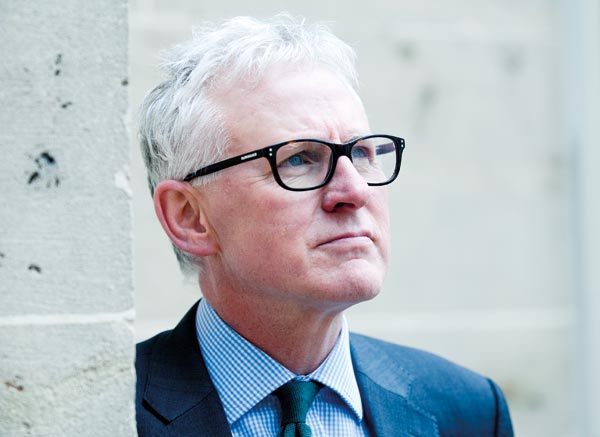By Judy Hirst | 1 April 2013
Care minister Norman Lamb has to square soaring demand for adult social services with declining budgets – and public outrage at poor standards. So how’s that going to work?

Minister for care and support. It sounds a bit touchy feely. Like something to do with group hugs and aromatherapy, that kind of thing.
But as Norman Lamb – the latest incumbent – has been finding out, the job is a tough old gig.
The Liberal Democrat MP, a former business minister and adviser to Nick Clegg, took over the care services brief last autumn, after a Cabinet reshuffle.
His health minister’s in-tray at Richmond House was already overflowing with shocking evidence of the lack of care and compassion meted out to some of our most vulnerable service users. It reads like a roll call of dishonour, incriminating both the NHS and social care.
Winterbourne View in Gloucestershire; Carefirst 24 in Surrey; and, post-Francis inquiry, the horrific revelations about Mid-Staffordshire NHS Trust. The shameful litany goes on and on.
Lamb has been firefighting all this and more since arriving at the Department of Health. The North Norfolk MP – previously the LibDem’s shadow health secretary and, in an earlier life, a prominent employment lawyer – is widely respected in the care sector for his hands-on, engaged approach.
Now, after Mid-Staffs, and with public concern about care standards ratcheted up to new heights, Lamb has been rolling up his sleeves to address the roots of the recent scandals.
Sitting in his Whitehall office, he tells me: ‘We’ve got to be utterly intolerant of poor care standards, or abuse or neglect, wherever it is. And we have to be very clear about corporate responsibility. We need to ask why this culture was allowed to develop.’
Indeed. But it’s a question that’s easier to ask than answer. Like his predecessors, the care minister faces the rock-and-a-hard-place dilemma of whether to intervene more – and be condemned for over-regulating and interfering – or do too little, and watch the next tragedy unfold.
The zeitgeist right now is all about ‘liberating’ the NHS and social care from over-bearing Whitehall control, via the far-reaching reforms that come on stream this month. The new Clinical Commissioning Groups, working in tandem with locally based Health and Wellbeing Boards, are meant to oversee and co-ordinate budgets and services, theoretically with a minimum of interference from the DoH or the NHS Commissioning Board.
But at a time of standstill NHS spending, and 27% cuts to council budgets (the bulk of which go on adult social care), how does all this organisational laissez-fairedom square with safeguarding vulnerable service users?
Lamb is impatient at any suggestion that the current reforms risk fragmenting care services.‘We have got completely fragmented care already,’ he says. ‘It’s institutionally fragmented between health and social care, mental and physical health, and primary and secondary care. It’s a remarkably irrational system.’
The new health architecture, by contrast, ‘provides us with the foundations and the legal framework for enthusiasts of care service integration, like myself, to make a difference’.
Nonetheless, there are concerns. Enough, in the case of Lamb, to have prompted him to step in at the eleventh hour – just as the NHS reforms were about to go live – and ensure that Section 75 of the Health & Social Care Act’s regulations were revised.
These are the rules that govern how CCGs procure services from providers. Critics – including most of the medical profession – had argued vociferously that Section 75’s wording was opening up the NHS to wholesale marketisation: a liberation too far.
Lamb has previous form in this debate. In 2011, when he was Nick Clegg’s chief political adviser, he threatened to resign over then health secretary Andrew Lansley’s ‘very risky’ proposed reforms. And with his keen lawyer’s eye, he would presumably have spotted the flaws in the Act’s regulations, which took on totemic importance in the run-up to the LibDems’ Spring conference.
So what kept him so long? ‘Look, coalition working is a developing science,’ he says enigmatically. ‘There was no conspiracy here, in my view. I gave a clear indication at health questions that I was concerned personally, and work got under way immediately on redrafting.’
He declares himself well satisfied with the outcome, which ‘introduces a very clear steer towards integration and co-operation’, and allows CCGs to ‘exercise discretion, rather than being forced down a competition route’.
Whatever debates Lamb might have had with fellow ministers – and the LibDems’ success at the Eastleigh by-election will surely have strengthened his hand – the regulatory mood, post-Francis report, is becoming more cautious.
As well as personally intervening over Section 75, Lamb has been meeting NHS regulator Monitor to emphasise its legal duty to promote care integration. He is also keen to remind the Care Quality Commission that its role is not just to focus on each individual care home or hospital, but also ‘on what happens above it in an organisation’.
Health Secretary Jeremy Hunt also appears to have caught the regulatory bug. Ofsted-style star ratings are being revived for hospitals and care homes, following a CQC report that showed one in four services were failing on basic standards. Hunt hopes the new system will help end the ‘crisis of care’.
If this all sounds a bit top-down, it indicates that – with the health reforms entering their delivery phase – the political stakes are very high. The succession of horrific care scandals has alarmed ministers, and – in the face of sustained campaigning by the Daily Mail and Daily Telegraph – prompted a rush of measures to try to detoxify the issue.
‘It’s the story that wouldn’t go away,’ says Richard Humphries, assistant director at the King’s Fund health think-tank. Social care, traditionally the Cinderella service, is finally getting a much higher profile. Some of this is due to the disturbing recent revelations.
But it’s also down to simple demographics and self-interest, he says. ‘The baby-boomer influence in politics and the media means that the issues raised recently by the Lords’ report on ageing can’t be so easily dismissed.’
Maybe this is why, contrary to expectations (not least by Lamb’s predecessor as care minister, Paul Burstow), the Dilnot Commission recommendations on long-term care funding were not just kicked into the Treasury long grass.
Not only has the government come up with a Dilnot-lite package on care costs, and a higher means-testing threshold. It has even revised it to bring the implementation date forward from 2017 to 2016 – reducing the initial care cost cap from £75,000 to £72,000.
The government’s proposals might not be quite the ‘historic step’ that Lamb has claimed. But most in the care sector would agree with him that the deal, to be enshrined in a Care and Support Act, ‘is an essential building block’ for a fairer system, and ‘a protection against catastrophic loss’. And, especially with the chancellor’s fine-tuning, it’s probably enough to avoid alienating the hugely important ‘grey vote’.
‘Perhaps only a coalition could have done this,’ says Lamb. ‘Governments of single parties have failed to deliver on long-term care reform.’
This is something he knows about from the inside. Lamb was heavily involved in cross-party talks on care funding that ended acrimoniously before the last general election. So he is gratified that there is now at least a stake in the ground.
But the devil is in the yet-to-be-worked-out detail. Lamb assures me that the whole Dilnot package has been costed (the £1bn additional annual care costs are to be funded via inheritance tax changes and pension reforms). But councils are understandably anxious at how they will set up the system and pay for the vastly increased numbers eligible for support.
Humphries says: ‘It’s going to take a lot of creative thinking to get the right formula, and make sure the right amount gets through to local authorities.’
John Jackson, head of resources at the Association of Directors of Adult Social Services, tells PF that ‘nobody knows precisely how it’s going to work out.’
Raising the eligibility threshold for care from £23,000 to £118,000 will mean a lot of extra costs for councils with the most self-funders, he says, and where property values are low.
Government talks are under way with the Local Government Association and Adass to figure out these complex issues. They’re happening at a very sensitive time. Ahead of the June 26 Spending Review, and with departmental turf wars in full spate, the NHS’s £100bn-plus protected budget – as against social care’s severely decimated one – is a highly contentious issue.
A recent King’s Fund report found that a third of adult services directors anticipate having to reduce provision. Privately, many say it’s all about to fall apart.
Some of Lamb’s coalition colleagues – notably Business Secretary Vince Cable – have been outspoken about removing NHS budget protection. Meanwhile, many in the care sector are lobbying for ring-fenced social care budgets to prevent funds being passported elsewhere.
Lamb is reluctant to get drawn into this debate but, when pressed, maintains it’s ‘completely sensible’ to protect the NHS budget, given the soaring costs. He also cites the £7.2bn extra funding made available to social care, over four years, as evidence that the government recognises the need to spend more on preventative services.
But a large chunk of that cash came from reallocating NHS underspends that the Treasury found down the back of a sofa before the last spending round.
‘With the only new money for social care coming from spending less on other things, they’re going to have to look again at the NHS budget in its totality,’ one departmental adviser told PF. ‘And Norman Lamb will be very up for that debate with fellow health ministers.’
He needs to be if the integrated care agenda, which he so passionately advocates, is to stand any chance of success. Prevention, reablement, community health – and all the other elements of a personalised and integrated service – don’t come cheap. Nor does the training in minimum standards for care staff that he is urgently promoting.
‘Yes, but it’s very seductive to say it’s all about money,’ says Lamb. With the spotlight on appalling care conditions, it’s easy to lose sight of how it’s done well. ‘It’s not beyond the wit of man to ensure everyone in this sector gets basic levels of training, so that our loved ones can feel safe and secure in their care.’
And care commissioners are going to have to change their ways too, he warns. ‘This distasteful idea of a race to the bottom, with 15 minutes of often quite intimate care from ever-changing care workers is unacceptable, full stop.’
By doing things differently – for example, by moving away from ‘irrational payment-by-results systems that don’t make sense for frail, elderly people with continuing care needs’ – he is convinced integration can be made to succeed.
‘Coming into this job, I have found huge enthusiasm for integration out there.’ And with the Commons health select committee, the King’s Fund and the Opposition all calling for joined-up services – not least on the pragmatic grounds that it’s the only way to survive these austere times – he might just be right.
Perhaps, as he says: ‘The stars are aligned to make this happen’, and this time social care really will go to the ball.
This article was first published in the April issue of Public Finance magazine



















